- Joined
- Oct 9, 2007
- Messages
- 47,895 (7.38/day)
- Location
- Dublin, Ireland
| System Name | RBMK-1000 |
|---|---|
| Processor | AMD Ryzen 7 5700G |
| Motherboard | Gigabyte B550 AORUS Elite V2 |
| Cooling | DeepCool Gammax L240 V2 |
| Memory | 2x 16GB DDR4-3200 |
| Video Card(s) | Galax RTX 4070 Ti EX |
| Storage | Samsung 990 1TB |
| Display(s) | BenQ 1440p 60 Hz 27-inch |
| Case | Corsair Carbide 100R |
| Audio Device(s) | ASUS SupremeFX S1220A |
| Power Supply | Cooler Master MWE Gold 650W |
| Mouse | ASUS ROG Strix Impact |
| Keyboard | Gamdias Hermes E2 |
| Software | Windows 11 Pro |
Intel in the second day of its InnovatiON event, turned attention to its next-generation Xeon Scalable "Sapphire Rapids" server processors, and demonstrated on-package accelerators. These are fixed-function hardware components that accelerate specific kinds of popular server workloads (i.e. run them faster than a CPU core can). With these, Intel hopes to close the CPU core-count gap it has with AMD EPYC, with the upcoming "Zen 4" EPYC chips expected to launch with up to 96 cores per socket in its conventional variant, and up to 128 cores per socket in its cloud-optimized variant.
Intel's on-package accelerators include AMX (advanced matrix extensions), which accelerate recommendation-engines, natural language processing (NLP), image-recognition, etc; DLB (dynamic load-balancing), which accelerates security-gateway and load-balancing; DSA (data-streaming accelerator), which speeds up the network stack, guest OS, and migration; IAA (in-memory analysis accelerator), which speeds up big-data (Apache Hadoop), IMDB, and warehousing applications; a feature-rich implementation of the AVX-512 instruction-set for a plethora of content-creation and scientific applications; and lastly, the QAT (QuickAssist Technology), with speed-ups for data compression, OpenSSL, nginx, IPsec, etc. Unlike "Ice Lake-SP," QAT is now implemented on the processor package instead of the PCH.
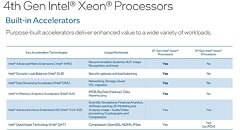

Intel's benchmarks for the Xeon Scalable "Sapphire Rapids" focus on each of the above accelerators, and how they help the processor work "smarter" than AMD EPYC and overcome the CPU core deficit; as well as save power along the way. The first set of benchmarks focus on Intel AMX, and the speed-up it offers with ResNet50v1.5 Tensorflow AI Image Classification benchmarks. The second set of benchmarks showcases the data-compression speed-up with QAT implemented at scale, with QATzip Level 1. The third set focuses on big-data analysis accelerated by IAA, using ClickHouse and RocksDB. The next set shows off the SPDK NVMe TCP Storage Performance acceleration provided by DSA. QAT is shown accelerating nginx and IPsec encryption.
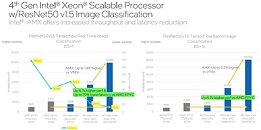
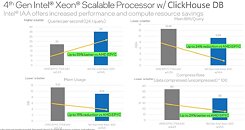
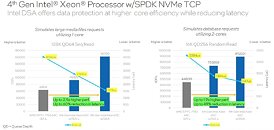
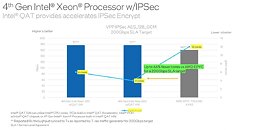
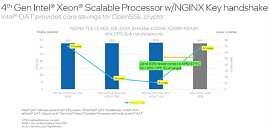
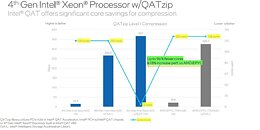

View at TechPowerUp Main Site
Intel's on-package accelerators include AMX (advanced matrix extensions), which accelerate recommendation-engines, natural language processing (NLP), image-recognition, etc; DLB (dynamic load-balancing), which accelerates security-gateway and load-balancing; DSA (data-streaming accelerator), which speeds up the network stack, guest OS, and migration; IAA (in-memory analysis accelerator), which speeds up big-data (Apache Hadoop), IMDB, and warehousing applications; a feature-rich implementation of the AVX-512 instruction-set for a plethora of content-creation and scientific applications; and lastly, the QAT (QuickAssist Technology), with speed-ups for data compression, OpenSSL, nginx, IPsec, etc. Unlike "Ice Lake-SP," QAT is now implemented on the processor package instead of the PCH.


Intel's benchmarks for the Xeon Scalable "Sapphire Rapids" focus on each of the above accelerators, and how they help the processor work "smarter" than AMD EPYC and overcome the CPU core deficit; as well as save power along the way. The first set of benchmarks focus on Intel AMX, and the speed-up it offers with ResNet50v1.5 Tensorflow AI Image Classification benchmarks. The second set of benchmarks showcases the data-compression speed-up with QAT implemented at scale, with QATzip Level 1. The third set focuses on big-data analysis accelerated by IAA, using ClickHouse and RocksDB. The next set shows off the SPDK NVMe TCP Storage Performance acceleration provided by DSA. QAT is shown accelerating nginx and IPsec encryption.







View at TechPowerUp Main Site




